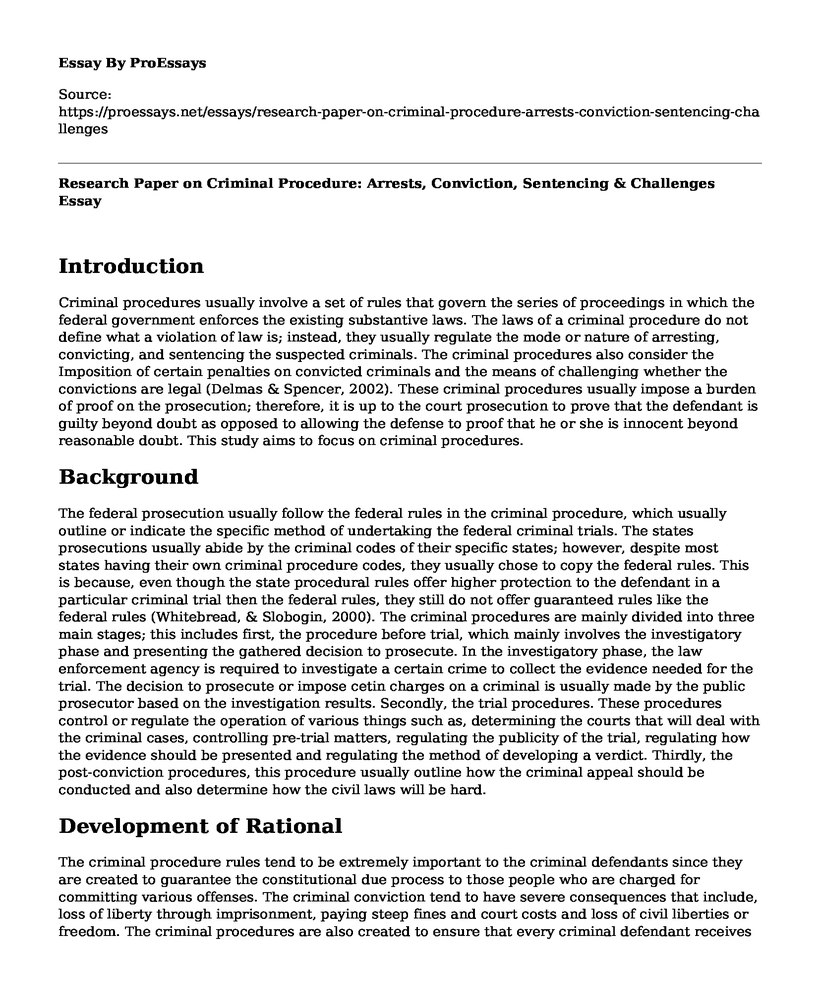Introduction
Criminal procedures usually involve a set of rules that govern the series of proceedings in which the federal government enforces the existing substantive laws. The laws of a criminal procedure do not define what a violation of law is; instead, they usually regulate the mode or nature of arresting, convicting, and sentencing the suspected criminals. The criminal procedures also consider the Imposition of certain penalties on convicted criminals and the means of challenging whether the convictions are legal (Delmas & Spencer, 2002). These criminal procedures usually impose a burden of proof on the prosecution; therefore, it is up to the court prosecution to prove that the defendant is guilty beyond doubt as opposed to allowing the defense to proof that he or she is innocent beyond reasonable doubt. This study aims to focus on criminal procedures.
Background
The federal prosecution usually follow the federal rules in the criminal procedure, which usually outline or indicate the specific method of undertaking the federal criminal trials. The states prosecutions usually abide by the criminal codes of their specific states; however, despite most states having their own criminal procedure codes, they usually chose to copy the federal rules. This is because, even though the state procedural rules offer higher protection to the defendant in a particular criminal trial then the federal rules, they still do not offer guaranteed rules like the federal rules (Whitebread, & Slobogin, 2000). The criminal procedures are mainly divided into three main stages; this includes first, the procedure before trial, which mainly involves the investigatory phase and presenting the gathered decision to prosecute. In the investigatory phase, the law enforcement agency is required to investigate a certain crime to collect the evidence needed for the trial. The decision to prosecute or impose cetin charges on a criminal is usually made by the public prosecutor based on the investigation results. Secondly, the trial procedures. These procedures control or regulate the operation of various things such as, determining the courts that will deal with the criminal cases, controlling pre-trial matters, regulating the publicity of the trial, regulating how the evidence should be presented and regulating the method of developing a verdict. Thirdly, the post-conviction procedures, this procedure usually outline how the criminal appeal should be conducted and also determine how the civil laws will be hard.
Development of Rational
The criminal procedure rules tend to be extremely important to the criminal defendants since they are created to guarantee the constitutional due process to those people who are charged for committing various offenses. The criminal conviction tend to have severe consequences that include, loss of liberty through imprisonment, paying steep fines and court costs and loss of civil liberties or freedom. The criminal procedures are also created to ensure that every criminal defendant receives the expected due process, and their rights are well protected. An example of a criminal procedure protecting the defendant constitutional right is the Miranda warning (Delmas & Spencer, 2002). In the Supreme Court ruling between Arizona and Miranda. The law makers located in various states within the united states started implementing the criminal procedures to ensure that the criminal defendant was given the required warnings before making any statement to the police. This kind of rules also have granted the defendants the right to confront the witness of the case and also the right to remain silent during the court trial
Justification
This is considered to be a defence in any criminal cases whereby the individual who committed a specific crime claims that he or she did no wrong because committing a certain crime enhances various social interests, which tend to outweigh the wrongfulness of a specific crime. Justification tends to be a form of defense during the prosecution of a criminal offense. When a certain act is justified by the court, an individual tends not to be criminally liable even though the act they committed would otherwise constitute a particular offense. For instance, intentionally committing a particular crime may be perceived to be murder; however, it may not be considered a crime if it is committed in self-defense. There is various type of criminal justification or defenses; this includes; first, mental disorder; this refers to the actor's lack of knowledge or understandings of the wrongfulness of committing a particular mistake. Secondly, automatism, this refers to the state in which the body muscles act of function without being controlled by the mind. Fourth, Intoxication, this is the state in which an individual performs a particular act involuntarily due to the effects of substance use. Fifth, the law capacity of the office. This type of defense is usually available to the public servants and first responders such as the firefighters, and police officers (Cassell, 2007). Sixth, the legal duty, this type of defense may apply to the civilians who do not hold any prominent position, but their assistance is needed in those positions.
References
Cassell, P. G., (2007). Treating Crime Victims Fairly: Integrating Victims into the Federal Rules of Criminal Procedures. Utah L. Rev., 861.
Delmas-Marty, M., & Spencer, J. R. (Eds.). (2002). European criminal procedures (Vol. 25). Cambridge University Press.
Whitebread, C. H., & Slobogin, C. (2000). Criminal procedure: an analysis of cases and concepts (p. 101). Eagan, MN: Foundation Press.
Cite this page
Research Paper on Criminal Procedure: Arrests, Conviction, Sentencing & Challenges. (2023, Jan 19). Retrieved from https://proessays.net/essays/research-paper-on-criminal-procedure-arrests-conviction-sentencing-challenges
If you are the original author of this essay and no longer wish to have it published on the ProEssays website, please click below to request its removal:
- Law Essay Example: Gilbert Law Summaries on Constitutional Law
- Ethics of Police Deception During Interrogation Annotated Bibliography
- Research Paper on Social Democracy
- Media Exposure and Violent Crimes - Essay Sample
- 2nd Amendment Blocks Sensible Gun Laws: Confiscation Unviable - Essay Sample
- Research Paper on Rising Healthcare Costs in Prisons: Elderly, Poor, Women, Mental Health
- Research Paper on Racial Disproportionality in Criminal Justice System: Causes and Impacts







